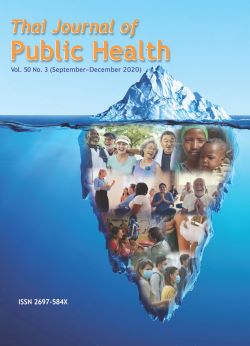Cost-Effectiveness of Establishing a Community-Based Friend Centre versus for MSM enting a Training Course
Keywords:
Cost-effectiveness, HIV/AIDS, Men who have sex with men (MSM)Abstract
This cross-sectional study aimed to determine the cost–effectiveness of two HIV prevention interventions: 1. a community-based friend centre (P1) versus 2. a training course (P2) for men who have sex with men (MSM) in Ubon Ratchathani province, Thailand. The interventions were implemented for two rounds (R1 and R2) during 2008-2010. The study involved 224 MSM who were enrolled in the two interventions between 2008 and 2010. Participants were interviewed using questionnaires to assess their knowledge and attitude towards HIV/AIDS. Cost-effectiveness analysis was carried out to compare the two interventions. There were 37 (51.4%) participants in R1 and 47 (65.3%) in R2 with sound knowledge for P1. For P2, 8 (20%) out of 40 in R1 and 17 (42.5%) in R2 were found to have sound knowledge of HIV/AIDS. 57 (79%) participants in R1 and 64 (88.9%) in R2 had preferable attitude for P1. 77.5% of participants in R1 and 85% in R2 had preferable attitude for P2. The costs per MSM with sound knowledge were 869 baht (27 USD) per person in R1 and 682 baht (21 USD) per person in R2 of P1, which were significantly lower compared to those of P2 for the same period (3,820 baht per person for P2R1, 1,899 baht per person for P2R2). The costs per one MSM with preferable attitude of P1, 564 baht (18 USD) per person for R1, 501 baht (16 USD) per person in R2 were significantly higher compared to that of P2 for the same round (1,455 baht per person in R1, 949 baht per person in R2). The results from our study suggest that establishing a community-based friend centre (P1) was more effective and cost-effective than implementing a training course (P2) for achieving desired outcomes with less cost. Therefore, the HIV prevention program for MSM should consider establishing a community-based friend centre in the long run rather than implementing a training course.
References
2. United Nations Development Programme (UNDP) and United States Agency for International Development (USAID) 2009. Asia Regional Consultation on MSM HIV Care and Support. Bangkok.
3. Van Griensven F et al. Continuing high HIV incidence in a cohort of men who have sex with men in Bangkok, Thailand. Presented at the 16th Conference on Retrovirus and Opportunistic Infections, Montreal, 8-11 February 2009 (Abstract no. 1037b).
4. World Health Organization (WHO). Regional office for South East Asia. 2010. HIV/AIDS among men who have sex with men and transgender population in South-East Asia, The current situation and national responses
5. United Nations Programme on HIV/AIDS (UNAIDS) and World Health Organization (WHO). 2009. AIDS Epidemic Update. Geneva.
6. Baral, S. et al. 2007. Elevated Risk for HIV Infection among Men Who Have Sex with Men in Low- and Middle-Income Countries 200-2006 A Systematic Review. BMC Medical Education 4(12): 339.
7. Griensven, V. et al. 2005. Evidence of a previously undocumented epidemic of HIV infection among men who have sex with men in Bangkok, Thailand. 19(5): 521-526.
8. Pattanaphesaj, J., and Teerawattananon, Y. 2010. Reviewing the evidence on effectiveness and cost-effectiveness of HIV prevention strategies in Thailand. BMC Public Health. ;10:401. 10: 40.
9. Bureau of Epidemiology. Prevalence and incidence of HIV infections in Thailand 2009. Ministry of Public Health, Bangkok, 2009.
10. Kahn, K. et al. 2001. Cost-effectiveness of the Mpowerment Project, a community-level intervention for young gay men. Journal of Acquired Immune Deficiency Syndromes 27(5): 482–491.
Downloads
Published
Issue
Section
License
Creative Commons License CC-BY-ND


